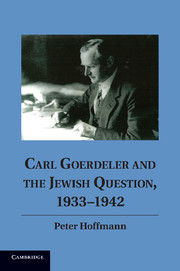7 - Analysis 2: Numbers
Published online by Cambridge University Press: 01 June 2011
Summary
The chapters on background (2) and context (4) showed Goerdeler personally defending and protecting Jews, where he could, against mistreatment and discrimination from the moment Hitler had become chancellor, and how he had progressed to opposition, conspiracy, and treason from attempts to influence German policy from ‘within’, based on his status as Reich prices commissioner until July 1935 and afterwards as an economic adviser to the government. At a turning point in the war, in the latter months of 1941, Goerdeler composed a ninety-nine-page memorandum for fellow conspirators designed as a basis for the renewal of German government and society after Hitler's fall. The context included efforts by a number of conspirators even then to bring about Hitler's downfall. They were motivated by the regime's crimes against Jews, prisoners of war, and civil populations in occupied territories; by the unjust war and its blundering conduct and the destruction of German and non-German lives and physical assets; and by morality and common decency. In the face of the mass murder of Jews in the Soviet Union and the beginning of deportations of the German Jews, Goerdeler wrote into his memorandum a proposal by which he intended to protect the Jews in the entire world, an arrangement that would place the Jews out of the reach of persecution by providing them, through international agreement, with the citizenship of a Jewish state and the international-law protection of the Jewish state's government and diplomatic representatives.
- Type
- Chapter
- Information
- Carl Goerdeler and the Jewish Question, 1933–1942 , pp. 140 - 168Publisher: Cambridge University PressPrint publication year: 2011

